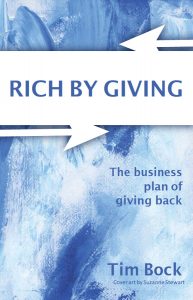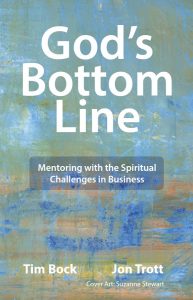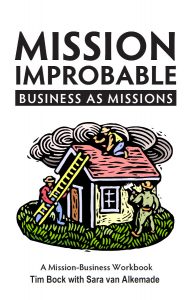Using current businesses to support direct ministry
Click on book to learn more, download or order
Tim Bock’s Blog
God’s Bottom Line Chapter Four
God’s Bottom Line
Mentoring with the Spiritual Challenges in Business
(A fictional adventure)
By Tim Bock & Jon Trott
Chapter Four
The feeling of well-being went beyond happiness; in part it was the release from a feeling of oppression. Jacob looked at his coffee cup, across the room at the dark-haired Zatha, at the white woven metal chairs and tables of Everybody’s Coffee. It was the same room but things were very different. “This is what peace feels like.”
Tim smiled at that. “Well, after that it’s a bit hard to go back to discussing mere business!” Both of them laughed. “But we do still have an hour, maybe more if you want, to discuss it.”
Jacob nodded. “But I’ll admit something, Tim. I think everything is changing. I’m beginning to change my opinion of my business.
Tim again smiled, “I’ll tell you a story. We had a business meeting with our leadership staff – all the guys came in to talk about our mission. And one of the guys – he heads up our customer relations – says to me, to all of us really, ‘I am into this because I can reach our customers with the gospel. I hate selling roofing materials. I just want to tell ‘em about Jesus.’
“And another guy sitting there listening says ‘Wait a minute. You’ve got passion for preaching the gospel. That’s great. But where’s your passion for the business? Is that somehow not worthy of your passion? It’s as if the Edge in U2 told us he didn’t really care that much about playing guitar. No, the dude’s passionate about guitar… that’s why he’s good. Part of you being a good Christian ought to be you being a good businessman. Be passionate in everything you do. Yeah, put things in their right order. But burn with intensity, man! And your passion itself is a powerful witness, passion in the care you take to get it right, to make sure the customer’s satisfied and feels he’s been treated not just fairly and ethically but – well, like he’s important beyond dollars and cents. That takes passion.’
Jacob nodded, excitedly leaning forward. “But what you’re saying is that in Christ I can rediscover that passion for my business?”
“Yes,” Tim said, twiddling a fork. “But it has to be, like you were, reborn. That is, not to be obnoxious with my same old question… But what is it that you want and how far are you willing to go to get it? The answer once was ‘I want my business to succeed, and I’m willing to go to any legal length to make it happen.’ Right?”
Again, Jacob nodded, but added, “I was willing because I loved it. I mean, there’s pleasure in seeing something unfold that you worked so hard for, conceptualized in your mind, sketched out on napkins, researched, mapped out on the computer and finally coded out, then recoded until it worked just like you’d dreamed. And then the pleasure of creating the company to sell it, which I did almost by myself really. I was so excited when it took off and just kept going.” He sighed and rubbed his forehead. “But of course I can’t go back there. It’s like being a pioneer in the old west, the thrill of finding that perfect piece of land and building a house log by log and suddenly finding you had a home. But then after that come the homesteaders, and after them the towns. Even if they name the town after you, all you can remember is that first night in the new cabin.”
“Or,” Tim interjected, “It’s like you’re discovering now what Jesus warned about.” He flipped through his Bible, then went to the back for its concordance. “Sorry, I forget where the verse is.” Both men laughed. “Bigger barns… no, barns… Okay, here it is. Luke 12. Jesus sits telling his parables: ‘The land of a rich man produced abundantly. And he thought to himself, “What should I do, for I have no place to store my crops?” Then he said, “I will do this: I will pull down my barns and build larger ones, and there I will store all my grain and my goods. And I will say to my soul, Soul, you have ample goods laid up for many years; relax, eat, drink, be merry.” But God said to him, “You fool! This very night your life is being demanded of you. And the things you have prepared, whose will they be?” So it is with those who store up treasures for themselves but are not rich towards God.’”
Tim leaned back, his eyes almost closed in concentration. Jacob waited, but Tim seemed to have no more to say. Jacob dove in.
“That helps me realize something that may seem strange. The emptiness I feel about my business may be God helping me realize that it really is empty – just building bigger barns. That feeling of loss and unrest – of futility of stuff I buy, really – has been like the noise an engine makes when there’s no oil left and the whole thing is just about to seize up. It’s letting me know something’s wrong.” A large smile lit up Jacob’s face. “Funny to think of being glad about something that’s been so painful; God’s been trying to flag me down. But if I was building bigger barns, what do I do now instead? I mean, I need to be rich toward God, like Jesus says… but that’s where I get snarled up. What does that mean, exactly?”
Tim, elbows on the table, bridged his fingers. “What do you think it means?” Jacob smiled. “Hey, I was hoping you knew. Honestly, like I told you the first time we met, I’ve been giving to charity and missions. But that’s not scratching the itch.”
Tim’s silence provoked Jacob. “Ok, you’re probably doing that Rogerian psychology thing where all you do is ask questions. But I’m asking you not to do that. You’ve been running a business. Tell me what you know.”
“I don’t know about the Rogerian business, but yes, I am trying to draw you out. Fair enough, though. Jesus says this crazy thing to Nicodemus, who was to religion like we are to business. That is, Nicodemus was a veteran in his chosen field of religious leadership. He knew his way around. But here comes Jesus and says something, recorded in John 3, that we’ve lost the strangeness of. ‘Very truly, I tell you, no one can see the kingdom of God without being born again.’ John 3:3.
Or like my Bible says, ‘without being born from above.’ Nicodemus – this guy who knows the Scriptures and on top of it – unlike some of his associates – is truly discerning, asks the exact right question. ‘How can anyone be born after having grown old? Can one enter a second time into the mother’s womb and be born?’
Customers got up from another table. The electric chime on the door sounded as they departed.
Jacob sighed. “Funny you should mention that chapter. There’s one line of John 3 that always bugged me… because I have actually thought about it in relation to my life… my business. Jesus says ‘What is born of the flesh is flesh, and what is born of the Spirit is spirit.’ And I know darn well that I built and nurtured my business from an unregenerate heart. So sure… it was from the dead old me, the flesh. It wasn’t Jesus’ idea.”
Jacob felt a rush of adrenalin. “I need to go back to square one, Tim. I built everything with no thought of God… or anyone else. I want to re-think everything, tear it all down in my head and…” the uprush of emotion faded. “You know what I mean? But… I suppose starting over with a new business is too simplistic. It’s like starting over with a new me that has no history. I mean, sure, I’m a new creature in Christ. But I’m still me. You don’t just pull a Cambodia – you know, the Khmer Rouge killing off millions of people – to try and erase a history that can’t be erased. I’m a Christian, sure. But I can’t destroy what I was or what I did. And I’ll botch it if I try. God doesn’t work it that way, does he? Am I making any sense?
Tim murmured an affirmative.
“So it’s that way with my business, too. If I were selling rocket launchers or something, I’d have to think hard about whether I could keep going. But I’m selling drafting software. The product could be used, come to think of it, for helping to design a rocket launcher…” he laughed at the absurdity, “but it gets used for more good than bad, I’m thinking. The real problem is –blast it, I don’t know what the real problem is.”
“But do you think there’s a problem? I mean, what you’re saying sounds like you do think so. Are you sure the issue is your business?”
“Yes.” Jacob’s response was emphatic. “I have other problems, obviously. I mean, the end of my marriage has definitely affected everything else. I’m a Christian, but really new at this. At my church, people treat me as someone who’s important, and ask me questions about God I can’t begin to answer. Why do they ask? They think I’m spiritual because I’m successful as a businessman. Nobody seems to wonder if my success is actually because I’m not spiritual HA. Sometimes I wonder if they understand spirituality themselves. Even Pastor Rivera seems to defer to me.” Jacob blushed. “And of course, I like it. Even while I hate myself for liking it, I like it – their attention, their deference.
“What would Jesus say to me if he walked into this room, I wonder? You’re telling me he’d say ‘I love you regardless of my performance’ But what I often sense at church is that I’m somebody because of my successful business. And that’s also the message I get from my non-Christian acquaintances. So it can be pretty depressing. In fact, you know why I go to church sometimes?” And at this Jacob’s jaw muscles visibly clenched before he spoke again. “Sometimes I go to church because it is one place where I’m the big fish.”
“We’re circling back to some of your feelings of being judged, I think,” said Tim. Jacob frowned. But Tim wouldn’t be dissuaded. “Well, hear me out before you disagree. You feel judged on one hand for your failures… but on the other for your successes. That is, your identity is in what others think of you. Isn’t it? Isn’t that even part of what motivates you in your business, that sense of success / failure, and how other people see it and see you through it?”
“I… I guess so.” But it was evident he didn’t fully agree.
“What if God’s main goal in your life was to help you see yourself the way He sees you, as his beloved son? And what if his hope is that you can in turn let go of everything else – all the false ideas about yourself that haunt you? God wants you to be haunted by his love, amazed by it, enthralled by it. If you’re focused on thinking about yourself, whether in terms of personal failure, corporate success, or what others are thinking about you… how can you dwell in God’s love? It’s like trying to whisper in a tin can factory. Way too much noise!”
Jacob nodded. “Right. And the more I think about myself, the less peace I have. I really like tranquility, which may seem a contradiction for a Type-A person. Yes I do like action and getting things done… but I yearn for that sense of rest.” He let out a long sigh. “I’m not good at love, either giving it or receiving it, and that isn’t something I’m saying out of self-pity. It’s something I know. But let me switch streams, Tim. Even if I do learn this lesson of love in my personal life – and that will be a miracle – how does it translate to me doing business? I’m back to square one there.”
Tim looked up at the clock. “Let’s do this.” He produced a typed pieced of paper from his Bible and handed it to Jacob. “Does this resonate with you? I carry it with me as a reminder.”
“Four Lessons God teaches me through my business.” Jacob’s eye followed down.1. Godly ethics from the bible are the only way we should operate business.
1. Ill-gotten gains are of no value. [Proverbs 10:2].
2. Jesus is, or should be, the Center of all that is planned and done. (“Love the Lord your God with all your heart, and with all your soul, and with all your mind, and with all your strength” [Mark 12:30].)
3. People are, or should be, my primary responsibility. People first then profits. (“Love your neighbor as yourself” [Mark 12:31].)
4. Business not done in, through, and by my utter dependence on God is a failure no matter what the spread sheets say. (“Unless the LORD builds the house, those who build it labor in vain” [Psalm 127:1].)
Jacob looked up at Tim. “Is this an answer to my question about love? I’m not seeing it. This seems too general again Tim, too abstract and even a bit too super-spiritual for me. I really need some meat and potato advice, direction…” Jacob held out the paper for Tim to take back.
“No, I’m giving you those. Read them over this week, pray about them. We’ll discuss ‘em next week, okay?”
Tim stood, waived to Zatha for the check. Jacob without thinking grabbed Tim’s hand. “Thanks. This meant a lot today all the talk of how I had my priorities mixed up with my marriage and all.” Jacob didn’t know how to say more. Tim squeezed Jacob’s hand. “I’m glad.”
Jacob turned to pick up his laptop bag, and as he turned back Tim was out the door. The clock read 12:17. He ambled to the front counter.
“Hey, you got any sandwiches?” he asked Zatha. She nodded, brushing her hair from her face.
“Yes we do. Ham, beef, veggie, 3-cheese, and turkey.” “Okay, what’s your personal favorite?”
“The smoked ham and provolone is really good; nine grain roll, too.” She held up a generous-looking plump roll with meat and cheese hanging from the sides. “The condiments are over here.”
Ever the businessman, Jacob couldn’t help but note that the condiments – generic packets of ketchup, mayonnaise and mustard – were rather haphazardly offered from one bin on the counter. One of the small packets had burst, staining some of the others. Gingerly he plucked out a couple mustard packets and dropped them into the bag with the sandwich. He paid and turned to go… then couldn’t help himself as he turned back to the counter.
“You know, you should let your owner know that presentation is important.” Jacob pointed at the condiment bin. “Each one of these should have its own small container. Or if I were him, I’d have you put them out of sight behind the counter so people see your baked goods and not a plastic bin.” Zatha listened with an odd half-smile on her face. “And as long as you’re telling him that you should also let him know that most places offer more than just three condiments, I mean, where’s his horseradish, his honey-mustard, or oils?”
“The owner is a she, and she is me.” Her half-smile turned to a frown.
“Oh, I’m so sorry!” He mentally kicked himself. “I really like your shop… just can’t help being a critic, I guess.”
Her frown blossomed into full smile. “I’m not upset… well, or I shouldn’t be. You’re right about that ugly ol’ thing.” And with that she pulled the bin behind the counter. “What you said… I’ll do something about that. And are there any other condiments you’d want to see?”
“Maybe some pickle relish?” She nodded, opened her mouth to speak but thought better of it.
“See you next week, then,” he said, taking his sandwich, headed for the door.
Thanks,
-Tim Bock
Chapter Three < God's Bottom Line Chapter Four > Chapter Five soon!
A free chapter will be released online roughly once or twice a month until the end of the book, but if you would like to read the whole book right away, the complete digital version is now only $0.99.
Download God’s Bottom Line for only $0.99
Be sure to join the Nehemiah Challenge Facebook Group!
https://www.facebook.com/groups/NehemiahChalCom





